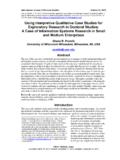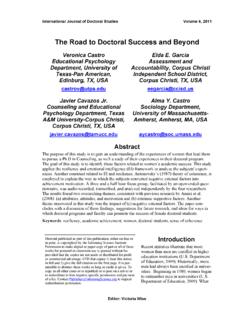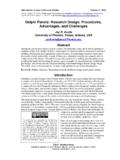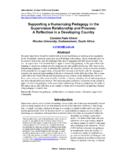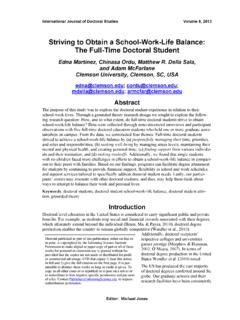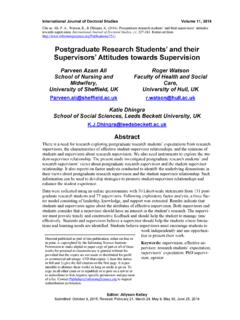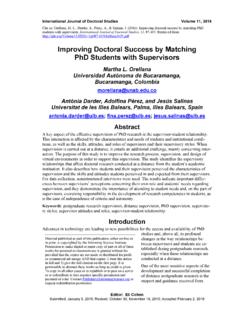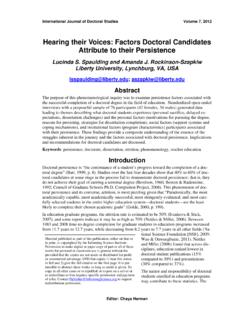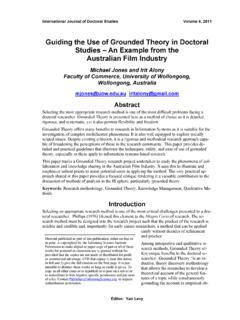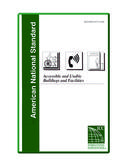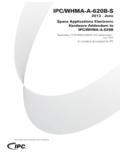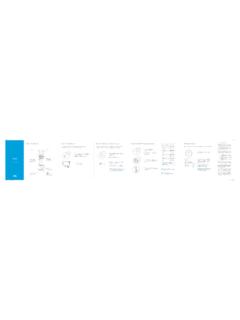Transcription of Cohort-Based Doctoral Programs: What We Have …
1 International Journal of Doctoral Studies Volume 9, 2014. Cite as: Bista, K., & Cox, D. (2014). Cohort-Based Doctoral programs : what we have learned over the last 18 years. International Journal of Doctoral Studies, 9, 1-20. Retrieved from Cohort-Based Doctoral programs : what We Have Learned Over the Last 18 Years Krishna Bista David W. Cox University of Louisiana at Arkansas State University, Monroe, Monroe, Louisiana, USA Jonesboro, Arkansas, USA. Abstract This paper assesses student perceptions and includes student reflections pertaining to a cohort model Doctoral program in Educational Leadership (EdD) at a Southern university in the United States. based on the open-ended comments and survey responses from 48 participants who graduated with this degree, the Cohort-Based Doctoral program was found to have met the needs of the students. Conclusions and recommendations are drawn based on extensive literature on cohort based EdD program and findings from this case study about one cohort model degree program.
2 Keywords: Cohort-Based Doctoral program; educational leadership; higher education Introduction Over four decades the Cohort-Based model in higher educational programs has been increasingly popular in the United States, the United Kingdom, Canada, and elsewhere. The rationale for the development of this model is associated with higher student retention rates as well as the optimal shared educational experience of the cohort members (Lei, Gorelick, Short, Smallwood, &. Wright-Porter, 2011; Maher, 2005). According to Seifert and Mandzuk (2006), the Cohort-Based education model develops mutual and intellectual stimulation, forms social ties, and enables the institutions to organize the programs in effective ways. Nimer (2009) mentions that the cohort - based Doctoral program offers its members an integral part of personal and professional support for academic interaction and degree completion. In such shared learning communities, educators have agreed that development of a strong social and professional network among the professors and students will positively impact student performance (Hyatt & Williams, 2011; Nimer, 2009.)
3 Williams & Simpson, 2010). Doctoral programs in Educational Leadership (EdD) at institutions of higher education in the United States are mostly built on a Material published as part of this publication, either on-line or in print, is copyrighted by the Informing Science Institute. Cohort-Based model in order to develop Permission to make digital or paper copy of part or all of these leadership skills, advanced research works for personal or classroom use is granted without fee skills, critical thinking skills, and provided that the copies are not made or distributed for profit problem solving skills for various or commercial advantage AND that copies 1) bear this notice administrative and leadership positions. in full and 2) give the full citation on the first page. It is permissible to abstract these works so long as credit is given. Loyola University at Chicago (2011). To copy in all other cases or to republish or to post on a server defines a cohort as a group of students or to redistribute to lists requires specific permission and who works through a program sequence payment of a fee.
4 Contact to request redistribution permission. Editor: Nicole Buzzetto-More Cohort-Based Doctoral programs together to achieve the same academic degree. According to Hyatt and Williams (2011, p. 54), EdD programs commonly integrate interdisciplinary theories from other fields including education, psychology, philosophy, and organizational studies. Such programs allow leadership students and practitioners to think radically new thoughts in their workplaces non-profit organizations, K-12 schools, higher education, and government (Rost, 1991). Bentley, Zhao, Reames and Reed (2004) have defined the cohort features as frames and metaphors for group learning and sharing knowledge, experience and support which capture the essence of their experience at Auburn University's EdD. program. based on Bolman and Deal's (2013) reframing organization's model, Bentley et al. (2004) identified the underlying structures of the program according to four interpretative frames: 1) a political frame (people coming together to interact in the class through a group philosophy), 2) the structural frame (roles and formal relationships), 3) a human resources frame ( cohort members as a family, support and resources for collaboration and professional growth), and 4) a symbolic frame (learning, culture, traditions, beliefs and emotions).
5 However, these earlier studies were descriptive in nature (Bentley et al., 2004; Lei et al., 2011;. Nimer, 2009; Seifert & Mandzuk, 2006). This paper evaluates the success of the Cohort-Based model educational leadership program through the eyes of the Doctoral students. To reduce extraneous variability, the paper focuses on students in a Doctoral program in Educational Leadership at XYZ University in the United States as a case study of a single cohort model. The paper starts with an extensive literature review in cohort model EdD programs . The paper also explores the strengths and drawbacks of the Cohort-Based model. The following research questions guided this study: a) what were the perceptions of graduates about the Cohort-Based model EdD program? and b) what were their overall experiences while earning the EdD degree? Overview of Doctoral programs in Educational Leadership (EdD). There is a well-established tradition of Doctoral programs in Educational Leadership across the United States.
6 The first Doctor of Education (EdD) was granted at Harvard University in 1921, then at Teachers College in 1934 (Toma, 2002). In England, the first EdD degree was awarded at the University of Bristol in 1992. Today, many universities in more than 30 countries are offering Cohort-Based Doctoral programs . Such university graduate leadership programs prepare students for college administration and leadership. Educators and researchers do not see significant differences between traditional PhD degrees and EdD degrees in education in terms of dissertation research quality and other outcomes (Augusto, 2009; Baez, 2002; Hallinger, 2011). However, many universities, including top-tier universities in the ( , Harvard University, University of Southern California, Vanderbilt University), have redesigned their Doctoral program in education within the past decade emphasizing practice over scholarship and school- based improvement over university level teaching (Purinton, 2012).
7 For instance, the University of Missouri redesigned its EdD curriculum in order to achieve higher levels of cognitive learning outcomes (Mountford, 2005). The EdD programs are tailored with different research and practitioner course components at various institutions of higher education with a specialization in Leadership, Curriculum Instruction, Community College Administration, Special Education, Higher Education, and/or Educational Policy. Designed for working-adult students, the cohort model educational leadership programs are administered in a majority of master's and Doctoral degrees granting universities in the United States. based on student populations, faculty numbers, and the mission of institutions, Cohort-Based models are described and designed as flexible open- cohort or as restrictive closed- 2. Bista & Cox cohort formats. A closed- cohort is a group of purposeful students entering and pursuing a program of study together characterized by social and cultural processes, shared experiences and interactions, collective efforts and mutual commitments to an educational goal (Pemberton &.)
8 Akkary, 2010, p. 180). In a closed cohort model, new students are never added once the cohort is underway. In contrast, an open- cohort is defined as flexible program (dynamic) as need of students and departmental mission where new members can leave or be recruited over time (LaMorte, 2012; Pemberton & Akkary, 2010). Educational Leadership Program at XYZ University The EdD in Educational Leadership program at a Southern university (called XYZ University in this study) started in 1992 as a closed cohort program. It was accredited by National Council for Accreditation of Teacher Education and Higher Learning Commission. The goals of this Doctoral degree are to increase the knowledge and skill in educational administration, enhance research skills, and provide the necessary credentials for those desiring to pursue a career in higher education or in the public school setting (Student Handbook, 2012, p. 15). The conceptual framework of this Doctoral program is designed around four themes--self, change process, organization, and leadership.
9 Self is designed and defined as a synthesis of values and traits that examines personal values and purposes toward professional maturity. Change is conceived as an inevitable process in which new, discernible patterns of action develop in the culture or behavior of people and organizations (Student Handbook, 2012, p. 15). Organization is taken as a venue for the dynamic interaction of people, their values, needs, expectations, and accomplishments. Leadership is defined as the act of encouraging interaction and inspiring vision to facilitate a process of organizational change (Student Handbook, 2012, p. 16).The EdD program focuses on the following six components: 1) Doctoral knowledge core 45 credits; 2) Research Foundations -9 credits; 3) Socio-Cultural Foundations -3 credits; 4) Psycho-Behavioral Foundations -3 credits;. 5) Leadership Foundations -18 credits; 6) Cognate Area/Leadership Electives -21 credits. This program requires a total of 99 credits beyond the bachelor's degree.
10 In addition to course work and dissertation, students are required to pass the comprehensive examination which includes three of the following four parts: cohort project, individual written exam, capstone narrative, and presentation or publication or grant writing. The program allows practitioners to pursue a Doctoral degree through the cohort model while remaining in their current position. At XYZ University, courses meet once a week from 4:00 pm to 10:00 pm throughout the academic year. The full course load for domestic students is six credit hours and nine credit hours for international students. The requirement for admission to the EdD. in Educational Leadership degree is competitive based on Standardized tests (Graduate Record Examination or Millar Analogies Test) and other requirements such as previous publication records, writing samples, and recommendations. Each year, a cohort of 15 students enters into the program.
